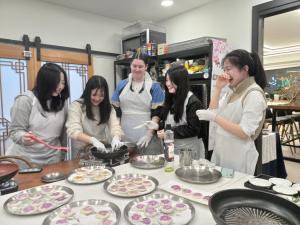 |
| ▲ Many students are studying abroad these days. (Photo from Pinterest) |
Being an exchange student is one of the most beneficial experiences of your college years. It can broaden your perspectives and expand your knowledge of a new country. According to Korea University’s Globalization and Future Task article, found in the Korean Council for University Education magazine Volume 189, the number of exchange students from Korea has increased from 31,670 students in 2001 to 36,786 in 2013. However, many students do not know how to prepare themselves before moving abroad for an exchange program. So, The Dankook Herald (DKH) interviewed experienced exchange students to learn more from their own adventures abroad.
The countries and schools found to have the highest rates of satisfaction according to a research survey conducted by the Global Strategy Team at Dankook University (DKU); include, Canada 85%, United States of America 72.3%, Asia 73.1%, Europe 77.3%. In accordance with the results, we managed to interview students that attended the schools in these countries with the highest satisfaction rates. The interviewees went to the University of Nevada in the US (USA), Okanagan College in Canada (CDN), Saint-Louis Brussels University in Belgium (BEL), Waseda University in Japan (JPN), Soochow University in Taiwan (TWN), and Jilin University and Chongqing University in China (CHN).
1. Before going as exchange student
The DKH: Did you do anything in order to be selected as an exchange student?
TWN and CHN: We were part of an organization called the ISA (International Students Organization). The organization aims to help foreign students that come to our school. They provide a certificate after one year of overseas service which definitely made our CVs look better.
BEL: It may vary for every university, but I took the English Proficiency test before applying for the exchange student program to let the school know my English level and I also had to write an essay on why I was applying for the program.
JPN: I think the management of our average GPA is the most important factor. As there are many other students also applying for the exchange program, the ones with the highest GPA will more likely be chosen.
The DKH: Before students go on an exchange, is there any way to get information about the country, classes, or school?
USA: After the final exchange student list is announced, selected participants must attend an orientation. You can learn pretty much everything about the exchange student program from this meeting. The only way to learn more is to search your new school’s homepage. If you are lucky enough, there could be blogs posted by former exchange students.
CDN: After confirming that you are going on the exchange, you are able to contact a recruiter from the host school by mail. You can find out a lot of information by contacting the recruiter.
2. While exchange student
The DKH: How did you apply for classes at the school in the host country and is there anything you have to know when you apply?
TWN: Because I am an exchange student, application for classes was a lot harder for me than it was for their university students. I had to write down the subjects that I wanted to take on a piece of paper that was given to me by the school and then I had to go around the school, looking for the professor to get his or her permission to take the class.
JPN: My experience was a bit different. You first register for the classes that you want to listen to and then the system randomly selects students for the class. If you were not picked the first time, you can try other classes for the second and third round of selection. Also, there is a class correction period, so please go to all the class orientations, since assignments or lectures can be very different.
The DKH: How were the classes taught and how did you study?
CDN: There are many assignments, especially for a sophomore course. Unlike Korea, there are no advantages for exchange students when it comes to assignments and tests. Therefore, students should prepare and review thoroughly. It is helpful to watch TED talks in advance, since lecture styles are very official and academic.
JPN: As I took classes in a language school, there were 10 to 30 people in a class. It was difficult for me to write an essay because I mainly studied listening and reading in Korea. But I improved my writing skills since my teacher helped me a lot.
 |
| ▲ Students from different countries are studying together. (photo from Pinterest) |
3. After exchange student, tips for the other students
The DKH: Are there any activities you recommend for students planning to study abroad?
TWN: There were many international programs in our school. For example, I ran in a marathon with other exchange students. Also, I tried various kinds of food and went to the night market with my friends. I got along with my friends and studied hard.
USA: As the vacation was long, I had a short internship during the summer vacation and traveled alone, which was a very good experience. For those who are planning to go abroad as an exchange student, I recommend they go on a trip and explore their host country.
JPN: I strongly recommend students get a part-time job in Japan. It is because they can experience the Japanese working culture and see Japan from a Japanese point of view.
The DKH: What was the best and worst thing you experienced as an exchange student? What are some things that students need to be careful about?
CHN: After studying in China, I learned the importance of learning foreign languages. So, I recommend students learn at least the basics of different language. Also, I broadened my horizons by traveling. However, I could only take 12 credits when I went to China as an exchange student.
JPN: I learned that students shouldn’t walk alone in areas where security is not good. Especially, places like Kabukicho around the eastern exit of Shinjuku Station and Shin-Okubo. They both become dangerous at night. Also, I recommend students visit many places and do various activities.
After learning more about their experiences, why don’t you take this opportunity to consider being an exchange student? It is clear that you will gain a good command of another language, interact with people from different countries and amass amazing memories that you will cherish for your lifetime.
신지희, 남윤경, Tsai Ming Hsuan, 나승민 dankookherald@gmail.com

 Going to Seoul for TOPIK? Now at DKU!
Going to Seoul for TOPIK? Now at DKU!






